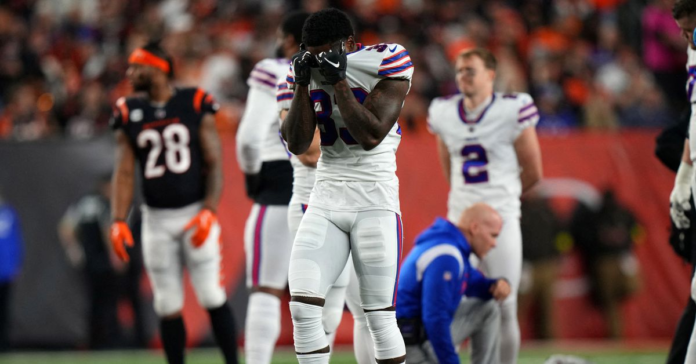Jan 3 (Reuters) – The time it took the National Football League (NFL) to postpone the game after Buffalo Bills safety Damar Hamlin suffered a cardiac arrest on the field against the Cincinnati Bengals came under renewed focus on Tuesday.
During the first quarter of Monday’s game, the 24-year-old Hamlin got to his feet after making a tackle on Cincinnati Bengals’ Tee Higgins and then collapsed.
Hamlin left the stadium by ambulance at 9:25 pm ET and was transported to a Cincinnati hospital where he was listed in critical condition.
The game was officially postponed by the NFL at 10:01 pm, but fans and former players had reacted angrily online after a broadcast had earlier said the teams would get a five-minute warm-up to prepare to play again.
“What’s taking so long,” retired twice Super Bowl champion Damien Woody said on Twitter at 9:44 pm. “Cancel the game!!”
“CANCEL THE GAME ALREADY,” former first-round quarterback Robert Griffin III wrote five minutes later.
The NFL said that there was never any discussion of resuming play and that it did not know where the broadcast had got the information regarding the warm-up.
“Frankly there was no time period for the players to get warmed up,” NFL Executive Vice President, Football Operations, Troy Vincent, told reporters.
“It never crossed our mind to talk about warming up to resume play. That’s ridiculous, that’s insensitive and that’s not a place we should ever be in.”
ESPN, which broadcast the game, said there was “constant communication” between ESPN, the league and game officials.
“We reported what we were told in the moment and immediately updated fans as new information was learned,” ESPN said in a statement. “This was an unprecedented, rapidly-evolving circumstance. All night long, we refrained from speculation.”
The National Football League Players Association (NFLPA) did not immediately respond to a request for comment but said in a statement that its focus “remains on the health of our brother, Damar Hamlin.”
‘UNPRECEDENTED SITUATION’
The league said on Tuesday that the game would not resume this week and that it had made no decision with regard to possibly resuming the game at another point in time.
Calling off the game involved a high-wire act with multiple parties in an “unprecedented situation”, said Patrick Sandusky, the former head of communications for the U.S. Olympic and Paralympic Committee and Madison Square Garden.
“Everything seems longer when you are watching in real time,” Sandusky told Reuters. “Given the complexities and logistics and everything involved in an unprecedented situation like that to have a decision and unilateral agreement within 30 minutes I think is pretty quick.
“The important thing there was to get it right, not fast and they did both.”
Reporting by Steve Keating in Toronto and Amy Tennery in New York Editing by Toby Davis
Our Standards: The Thomson Reuters Trust Principles.


